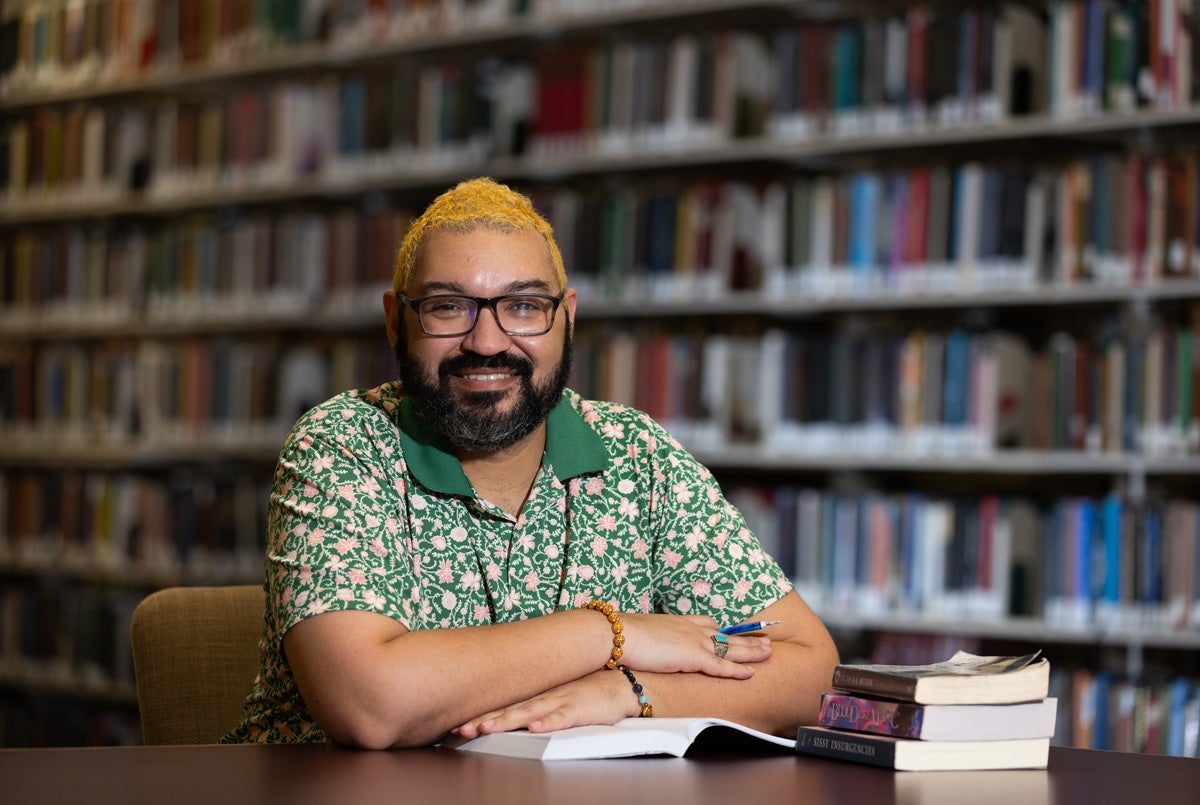University of California, Riverside

Beyond the Bindings of Speculative Fiction
Through UCR’s Speculative Fictions and Cultures of Science program, researchers are expanding our understanding of a traditionally Eurocentric field by adding new, diverse perspectives
O ne of Michael Pfirrmann-Pugh’s favorite childhood memories is time spent with his mother watching the crew of the starship Enterprise “boldly go where no one has gone before” on “Star Trek: The Next Generation.” A love for all things science fiction was further nurtured by the many books the two would read together, including works like “Crystal Singer” from Hugo award-winning author Anne McCaffery and Michael Crichton’s iconic novel “Jurassic Park.” But it wasn’t until he was introduced to the pioneering work of science fiction visionary Octavia Butler during his undergraduate studies at UCLA that a passion for the genre fully took hold.
“At that moment, I thought, ‘Oh, finally! We actually see Black people in science fiction!’” he said. “This opened up a new world of authors for me, and I have not looked back since.”

Michael Pfirrmann-Pugh, a graduate student in the SFCS program, is focusing his research on Black literary and cultural production. (UCR/Stan Lim)
Now Pfirrmann-Pugh is working towards a doctorate in English at UCR, with a designated emphasis in Speculative Fictions and Cultures of Science, or SFCS. A rare gem within English departments across the United States, the SFCS program was founded in 2013 as an academic unit complementing UCR’s extensive Eaton Collection of Science Fiction & Fantasy. Exploring the intersections among speculative fiction, science and technology studies, and traditions of speculative thought, the program offers both a designated emphasis at the Ph.D. level and an undergraduate minor.
Associate Professor of English andré carrington leads the SFCS program in collaboration with a steering committee comprising faculty members from the English; media and cultural studies; anthropology; philosophy; Black study; and society, environment, and health equity departments. This interdisciplinary structure enables graduate students to pursue interests in topics that cross the boundaries of science and technology studies and the humanities.
“At that moment, I thought, ‘Oh, finally! We actually see Black people in science fiction!’”
“It’s a way to link together courses they want to take in multiple departments, form relationships with faculty in other disciplines, and define their own research,” carrington said. “Every student who pursues this emphasis does an independent study on a topic of their choosing that can extend their interest in science fiction, fantasy, or science and technology studies beyond coursework, reading, games, or entertainment.”
Pfirrmann-Pugh’s research centers on Black literary and cultural production, including film, comic books, television, and animation, with his current research looking at Black hair as part of a character’s persona. His dissertation will focus on Black queer fiction from the 1990s to the present. Pfirrmann-Pugh is also the first graduate student to teach a course on Black superheroes. Modeled after a course developed by award-winning graphic novelist and UCR media and cultural studies professor John Jennings, who is also part of the SFCS program’s faculty, Pfirrmann-Pugh’s iteration of the class looks at comics and other mediums to analyze the ways in which Black superheroes are represented and viewed.
Now in his third year of the program, Pfirrmann-Pugh says pursuing the SFCS emphasis has given him access to a world of Black characters and superheroes that were missing from his childhood. With the goal of becoming a professor himself, he wants to make sure young people see more Black and ethnically diverse characters in popular culture.
“I hope this program helps scholars see the value of literature and culture as ways of playing out the lessons of history and our hopes for the future.”
“All my mentors said I had to be here. Now I know why. The Ph.D. program is great; we have fabulous professors,” Pfirrmann-Pugh said. “I chose this program because of the way we are able to dabble. Most Ph.D. programs don’t have something like this, and it offers a way to expand our knowledge and research.”
Beyond delving deep into their own niche interests, the program encourages scholars to explore the role of popular culture and speculative fiction more broadly, highlighting the ways in which these genres can serve as an imaginative testing ground for technological innovation, articulate hopes and anxieties about technological change, and mediate public understanding of science and its applications.
“These days, reality looks a lot like science fiction,” carrington said. “I hope this program helps scholars see the value of literature and culture as ways of playing out the lessons of history and our hopes for the future.”

